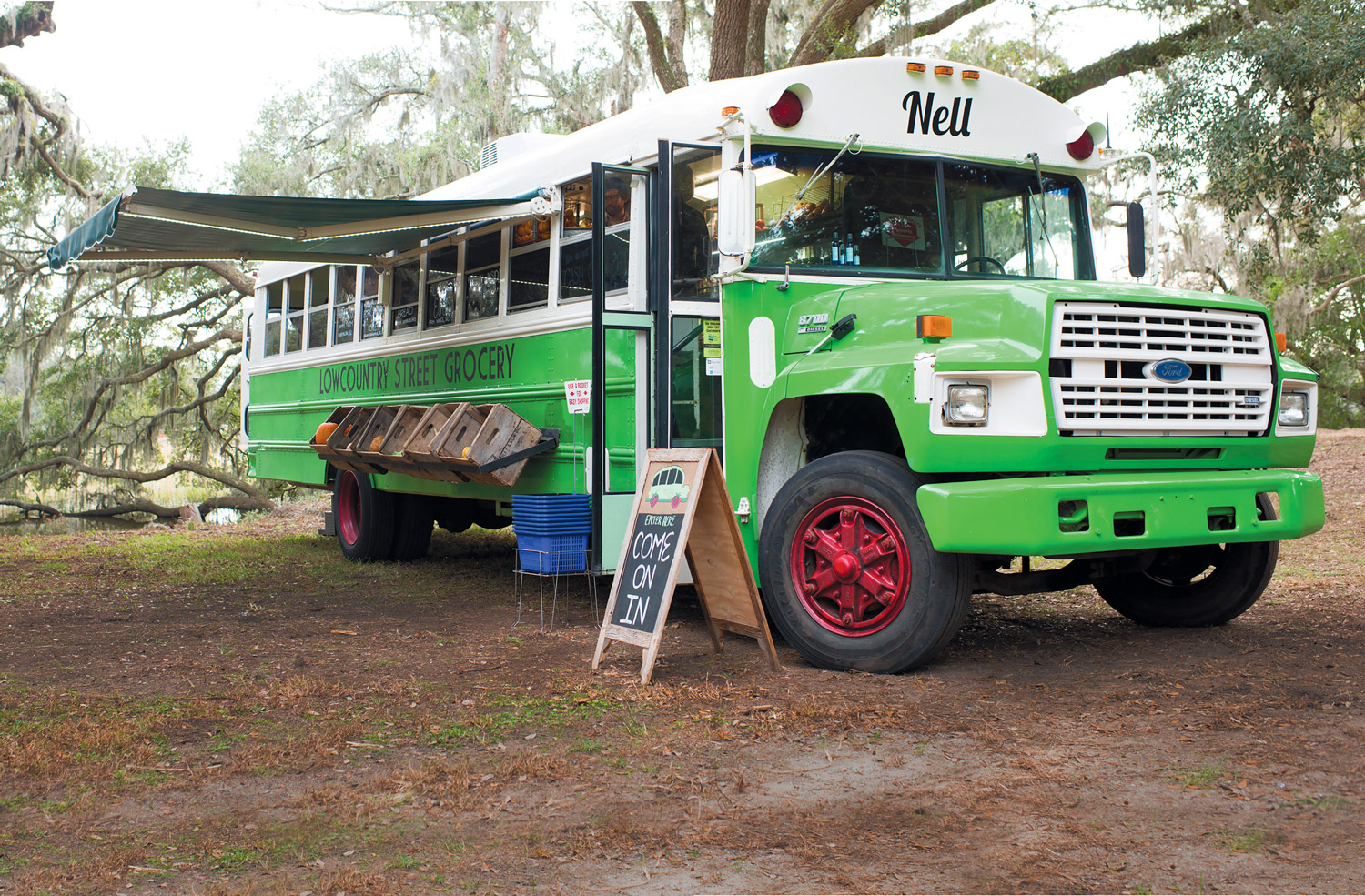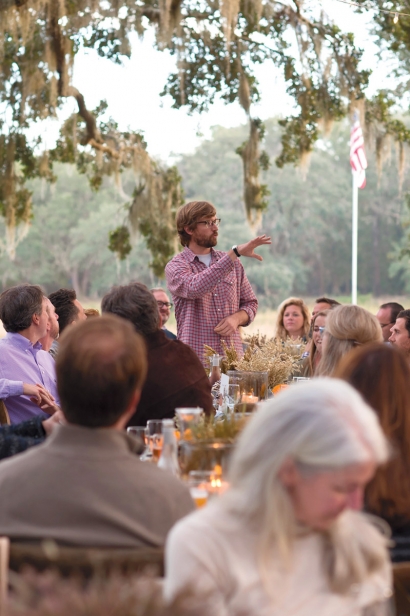Groceries On the Go with Lowcountry Street Grocery
Hidden within Charleston’s vibrant food scene, there is a dark spot. In a region dense with James Beard Foundation awards, trendy farmers’ markets and top-rated restaurants and chefs, there are food deserts where entire communities live without access to grocery stores and fresh, healthy produce. This gap and its consequences are visible and urgent, and many in the local Charleston food and beverage industry want to use the momentum that the city has gained in its award-winning food scene as a catalyst for social good.
One such person is Lindsey Barrow, founder of Lowcountry Street Grocery, a mobile farmers’ market that travels to various stops throughout the Charleston area in a refurbished school bus, and is driven by a mission to provide access to healthy, nutritious and local food, while at the same time bolstering the local small farm economy.
Barrow has held an interest in local food and farms since he was very young. Growing up, his grandfathers were gardeners, and he was the kid who would forgo pizza in favor of eating any kind of vegetable.
“I always had a love for veggies. Seriously, there’s a home video of me in one of their gardens walking around with a gourd on a stick, at 5, claiming I’m the King of Vegetables,” Barrow remembers, laughing.
That childhood love for local food and farming found its way into his professional life. As a legislative aide in Hawaii, Barrow was tasked with battling the diabetes epidemic by developing a method to bring healthy food and farmers’ markets to low-income communities that had limited or no access to nutritious food options. This work allowed him to apply his duel passions for local food and social equality.
After moving to Charleston, Barrow again encountered this problem of lower-income communities having little or no access to healthy, local foods. Rather than sitting idly by, he decided to use what he had learned in Hawaii to do something about it.
“There is a very serious inequality in our local food system,” Barrow says, describing how the chic coffee shop where we sit is a perfect example of the problem Charleston faces. The shop is surrounded by numerous trendy restaurant options, but is mere miles away from communities where people are living further beneath the poverty line than almost anywhere else in the state, and do not have the same ready access to the farmers’ markets and health food stores that Charleston’s more affluent residents do.
“I have a big problem celebrating everything that’s great about Charleston and continuing to ignore that issue,” he says
Barrow recognized that Charleston has a high demand for local, sustainable food and a reconnection to the farmers who grow it, but that access was only granted to a portion of the population.
“We had systems in place that were increasing the divide, rather than bringing these things together,” he says.
Barrow wanted to be able to take that demand and use it for low-income communities in a process he calls “Robin Hood economics.”
“Let’s bring produce to the people,” Barrow says about his plan for developing Lowcountry Street Grocery. “We can force farmers’ markets into low-income, low-access areas.”
Barrow began building a concept of supporting local small farms by providing them with more outlets to share their food, while at the same time helping local communities by giving them the same access to healthy, local food, regardless of income level. By shopping at the mobile farmers’ market, more affluent communities are supporting a business that provides lower-income communities access to nutritious and locally grown food, and customers of all means are supporting local small farms—resulting in Lowcountry Street Grocery nurturing a synergistic local economy.
To really understand how a small farm economy works, Barrow and his Lowcountry Street Grocery staff started by taking a year to work on Rebellion Farm just outside of Charleston, in Ravenel, South Carolina. He then applied what they learned through that experience to their idea of a mobile farmers’ market.
“There’s no middleman with us,” Barrow says. “All of our local farms deliver directly to the bus, so it only goes through two hands.”
The Lowcountry Street Grocery bus currently has 12 weekly stops, so the farmers who participate in this mobile farmers’ market reach an additional 12 outlets for their wares, all without having to take time and energy away from work on their farm, as they would in a traditional farmers’ market. This model provides extra opportunities for local farmers, as well as fresher food to Lowcountry Street Grocery’s consumers. Food that is harvested that morning can be delivered to the bus and distributed throughout the Charleston area’s communities that same day, resulting in increased access to healthier and more nutrient-dense food.
Being local is paramount to Lowcountry Street Grocery. The entire staff is from the Growing New Farmers program, which provides education and training in sustainable farming. Lowcountry Street Grocery also has a strong partnership with Lowcountry Local First, a nonprofit dedicated to growing the local economy. And of course, Lowcountry Street Grocery itself sells a wide variety of Charleston-area produce, meat and eggs, as well as locally-made household essentials, such as candles.
Barrow’s passion for what Lowcountry Street Grocery stands for and supports is evident in any conversation with him.
“I think that the very simplistic way of life that we’ve gone so far away from is so helpful and so natural, and it’s easy to recreate. That feeling, when you’re at an old farmers’ market or when you’re at an old store or roadside farm stall—that’s a real feeling. It’s not made up, it’s not make-believe. There’s an unbelievable amount of pride and sense of community in just a simple exchange from a lady who sold me something that she grew and harvested this morning.”
Barrow has fostered this very sense of community in Lowcountry Street Grocery, and extended it to the greater Charleston community. A stop at his mobile farmers’ market is a step back to simpler times, a step back to genuine relationships among members of the local food economy.






